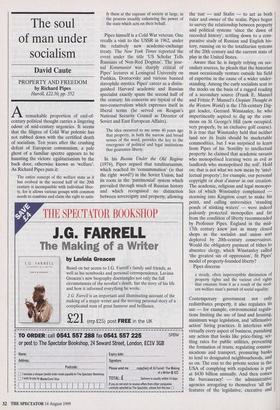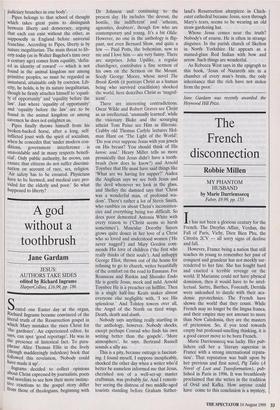The soul of man under socialism
David Caute
PROPERTY AND FREEDOM by Richard Pipes Hamill, £22.50, pp. 352 Aremarkable proportion of end-of- century political thought carries a lingering odour of mid-century urgencies. It seems that the filigree of Cold War polemic has not rubbed down with the certified death of socialism. Ten years after the crushing defeat of European communism, a pale ghost of a familiar spectre appears to be haunting the victors: egalitarianism by the back door, otherwise known as 'welfare'. As Richard Pipes puts it:
The entire concept of the welfare state as it has evolved in the second half of the 20th century is incompatible with individual liber- ty, for it allows various groups with common needs to combine and claim the right to satis- fy them at the expense of society at large, in the process steadily enhancing the power of the state which acts on their behalf.
Pipes himself is a Cold War veteran. One recalls a visit to the USSR in 1962, under the relatively new academic-exchange treaty. The New York Times reported the event under the title 'US Scholar Tells Russians of Non-Red Dogmas'. The jour- nal Kommunist was sharply critical of Pipes' lectures at Leningrad University on Pushkin, Dostoevsky and various banned slavophile mystics. Pipes' career as a distin- guished Harvard academic and Russian specialist exactly spans the second half of the century; his concerns are typical of the neo-conservatism which expresses itself in liberal terms (he served on Reagan's National Security Council as Director of Soviet and East European Affairs).
The idea occurred to me some 40 years ago that property, in both the narrow and broad senses of the word, provides the key to the emergence of political and legal institutions that guarantee liberty.
In his Russia Under the Old Regime (1974), Pipes argued that totalitarianism, which reached its 'consummation' (is that the right word?) in the Soviet Union, had its roots in the 'patrimonial' system which prevailed through much of Russian history and which recognised no distinction between sovereignty and property, allowing the tsar — and Stalin — to act as both ruler and owner of the realm. Pipes began to survey the relationship between property and political systems 'since the dawn of recorded history', settling down to a com- parative study of Russian and English his- tory, running on to the totalitarian systems of the 20th century and the current state of play in the United States.
Aware that he is largely relying on sec- ondary sources, he pleads that the historian must occasionally venture outside his field of expertise in the cause of a wider under- standing. Among the early socialists sent to the stocks on the basis of a ragged reading of a secondary source (Frank E. Manuel and Fritzie P. Manuel's Utopian Thought in the Western World) is the 17th-century Dig- ger leader, Gerrard Winstanley, he who impertinently aspired to dig up the com- mons on St George's Hill (now occupied, very properly, by an exclusive golf course). It is true that Winstanley held that neither land nor its fruits should be marketable commodities, but I was surprised to learn from Pipes of his 'hostility to intellectual property: he claimed that academic savants who monopolised learning were as evil as landlords who monopolised the soil'. Hold on: that is not what we now mean by 'intel- lectual property'; for example, our personal copyright or droit d'auteur in our creation. The academic, religious and legal monopo- lies of which Winstanley complained — storming into Kingston court to make his point, and calling universities 'standing ponds of stinking waters' — were indeed jealously protected monopolies and far from the condition of liberty recommended by Professor Pipes. England in the mid- 17th century knew just as many closed shops as the socialist and union sort deplored by 20th-century conservatives. Would the obligatory payment of tithes to absentee clergy, which Winstanley called `the greatest sin of oppression', fit Pipes' model of property-founded liberty?
Pipes discerns
a steady, often imperceptible diminution of property rights and the various civil rights that emanate from it as a result of the mod- em welfare state's pursuit of social equality.
Contemporary government not only redistributes property, it also regulates its use — for example, environmental regula- tions limiting the use of land and housing, minimum wage legislation, and 'affirmative action' hiring practices. It interferes with virtually every aspect of business, punishing any action that looks like price-fixing, set- tling rates for public utilities, preventing the formation of trusts, regulating commu- nications and transport, pressuring banks to lend to designated neighbourhoods, and so on. The cost to the private sector in the USA of complying with regulations is put at $430 billion annually. And then comes the bureaucracy! — the administrative agencies arrogating to themselves 'all the features of the legislative, executive and judiciary branches in one body'.
Pipes belongs to that school of thought which takes great pains to distinguish between liberty and democracy, arguing that each can exist without the other, as supposedly in England before universal franchise. According to Pipes, liberty is by nature inegalitarian. The main threat to lib- erty today (as in Walter Bagehot's time over a century ago) comes from equality, 'defin- ed as identity of reward' — which is not found in the animal kingdom nor among primitive peoples, so must be regarded as unnatural, attainable only by coercion. Lib- erty, he holds, is by its nature inegalitarian, though he firmly attaches himself to 'equali- ty of opportunity' and 'equality before the law'. Just where 'equality of opportunity' and 'equality before the law' are to be found in the animal kingdom or among cavemen he does not enlighten us.
Pipes finally throws himself from his broken-backed horse, after a long, self- inflicted joust with the spirit of socialism, when he concedes that 'under modern con- ditions, government interference is unavoidable and in many respects benefi- cial'. Only public authority, he avows, can ensure that citizens do not suffer discrimi- nation on account of race, sex, religion. Air safety 'has to be ensured. Physicians have to be licensed, and medical care pro- vided for the elderly and poor.' So what happened to liberty?



























































 Previous page
Previous page